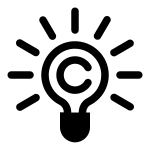
Back انتهاك حقوق التأليف والنشر Arabic Infracción de derechos d'autor AST Müəlliflik hüququ pozuntusu Azerbaijani Авторлыҡ хоҡуғын боҙоу Bashkir মেধাস্বত্ব লঙ্ঘন Bengali/Bangla Infracció de copyright Catalan پێشێلکردنی مافی لەبەرگرتنەوە CKB Torri hawlfraint Welsh Piratkopiering Danish Urheberrechtsverletzung German

Copyright infringement (at times referred to as piracy) is the use of works protected by copyright without permission for a usage where such permission is required, thereby infringing certain exclusive rights granted to the copyright holder, such as the right to reproduce, distribute, display or perform the protected work, or to make derivative works. The copyright holder is typically the work's creator, or a publisher or other business to whom copyright has been assigned. Copyright holders routinely invoke legal and technological measures to prevent and penalize copyright infringement.
Copyright infringement disputes are usually resolved through direct negotiation, a notice and take down process, or litigation in civil court. Egregious or large-scale commercial infringement, especially when it involves counterfeiting, is sometimes prosecuted via the criminal justice system. Shifting public expectations, advances in digital technology and the increasing reach of the Internet have led to such widespread, anonymous infringement that copyright-dependent industries now focus less on pursuing individuals who seek and share copyright-protected content online,[citation needed] and more on expanding copyright law to recognize and penalize, as indirect infringers, the service providers and software distributors who are said to facilitate and encourage individual acts of infringement by others.
Estimates of the actual economic impact of copyright infringement vary widely and depend on other factors. Nevertheless, copyright holders, industry representatives, and legislators have long characterized copyright infringement as piracy or theft – language which some U.S. courts now regard as pejorative or otherwise contentious.[1][2][3]
- ^ Cite error: The named reference
Dowlingwas invoked but never defined (see the help page). - ^ "MPAA Banned From Using Piracy and Theft Terms in Hotfile Trial". 29 November 2013. Archived from the original on 30 November 2013. Retrieved 30 November 2013.
- ^ "MPAA Banned From Using Piracy and Theft Terms in Hotfile Trial". Archived from the original on 3 December 2013. Retrieved 30 November 2013.
© MMXXIII Rich X Search. We shall prevail. All rights reserved. Rich X Search
